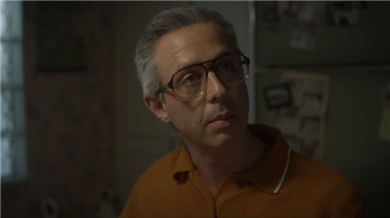[Editor’s note: The following post contains spoilers for “Armageddon Time” and its ending.]
Like many viewers of “Armageddon Time,” star Jeremy Strong is still wrestling with his thoughts on its conclusion. Although the incredibly personal film from writer-director James Gray, about a young Jewish kid named Paul Graff living in Queens during the 1980 rise of Ronald Reagan, offers its protagonist the option to do the right thing and stand against the anti-Black racism he’s become more and more privy too, the character (played by Banks Repeta) never takes an explicit public stance.
“Complicity is the engine that keeps racism going and keeps inequity and injustice going,” said Strong in conversation with IndieWire during the 2022 Telluride Film Festival. “Complicity, I would say, more than active harm.” The actor’s comment is both part of a conversation about the third act of “Armageddon Time,” where Paul convinces his Black classmate Johnny (Jaylin Webb) to unsuccessfully pawn a stolen computer, and then lets him take the fall for the scheme when the police catch them, and about the film’s overall ethos.
After all these long conversations viewers have seen Paul have with his grandfather Aaron (Anthony Hopkins) about tolerance, and defending the less fortunate Johnny, and even defending himself against the anti-Semitism happening at his new school, he still does not push back against his insensitive father Irving (Strong) dismissing the idea they use their privilege and standing in the neighborhood to help his friend get out of jail too because that is just the way the world works.
“Listen, that final scene in the car is excruciating for Irving, because what the movie does so brilliantly is it sets up the American dream — the so-called American Dream — which is accessible to some, [but] not accessible to others,” said Strong. “Johnny’s dreams are, at the end of the day, expendable, which is tragic and heartbreaking. And Irving is not blind to that. Irving doesn’t want to see this 12-year-old boy’s life get derailed, and then have this boy become incarcerated and his life is over in so many ways. But he also is trying to protect his son and help his son survive in an unfair world.”
Banks Repeta and Jaylin Webb in “Armageddon Time”
Anne Joyce / Focus Features
While many celebrated supporting actor roles are characters that give the audience an idea of who they are and what their ideology is from the jump, Strong’s Irving starts off dull, rambling along at the dinner table. From there, each of his scenes ekes out a new facet to the character, peeling away at the moody father’s layers.
“You experience moments of great tenderness, moments of goofiness, moments of rage, moments of brutality, moments of him being a dreamer, like all of us,” said Strong. By the end of the film we understand the character to be a man that wants to both view himself as the underdog, yet still be able to wield his socioeconomic power in whatever way benefits him most. It’s something similar to Strong’s performance as Kendall Roy on “Succession,” which garnered the actor an Emmy in 2020.
“This movie, and in a way ‘Succession,’ is about the sort of blindness and complicity of white privilege,” said Strong. He points to a moment where Paul hears his new white private school classmates make racist comments and doesn’t admonish them for it as “a moment where through weakness rather than violence, that boy chooses social acceptance and peer acceptance over courage and integrity.”
He compares it to Kendall’s “Chappaquiddick event,” as Strong refers to it, in the “Succession” Season 1 finale. “Kendall is trying to do his best. I certainly have to believe that I’m trying to do my best. But there are so many ways in which that falls short and is harmful to others, the blast radius of my behavior.” With his “Armageddon Time” character in particular, the actor said, “There’s almost a grandiosity to Irving which is out of tune with the reality of his circumstances. I think he sees himself in a quite elevated way. Quite the expert, quite the king of his Camelot in Queens.”
However, it’s not money that gets Paul out of jail scot-free, it’s the fact that Irving, a plumber, had previously provided his services to one of the cops. Had the police been anti-Semitic, the situation could have gone a lot differently. It is understandable that Irving would teach his son Paul to embrace the advantages that life offered them in that particular circumstance, but the gray area presenting a moral quandary is just how damning it is for him to not help his son’s friend who is dealing with a much steeper disadvantage.
“I don’t know what I think. I don’t put my own judgment on that,” said Strong. “But I think great films build to situations like ‘Sophie’s Choice’ where you’re in a double bind, and there’s no easy way. Any way is a hard way that costs you something irrevocable of yourself.”
He added that with “Armageddon Time,” “James crafted this movie that builds towards this morality tale of modern America. It’s just profound.”
A Focus Features release, “Armageddon Time” is out now in select theaters and will expand to wide release on Friday, November 11.
Source: Read Full Article


